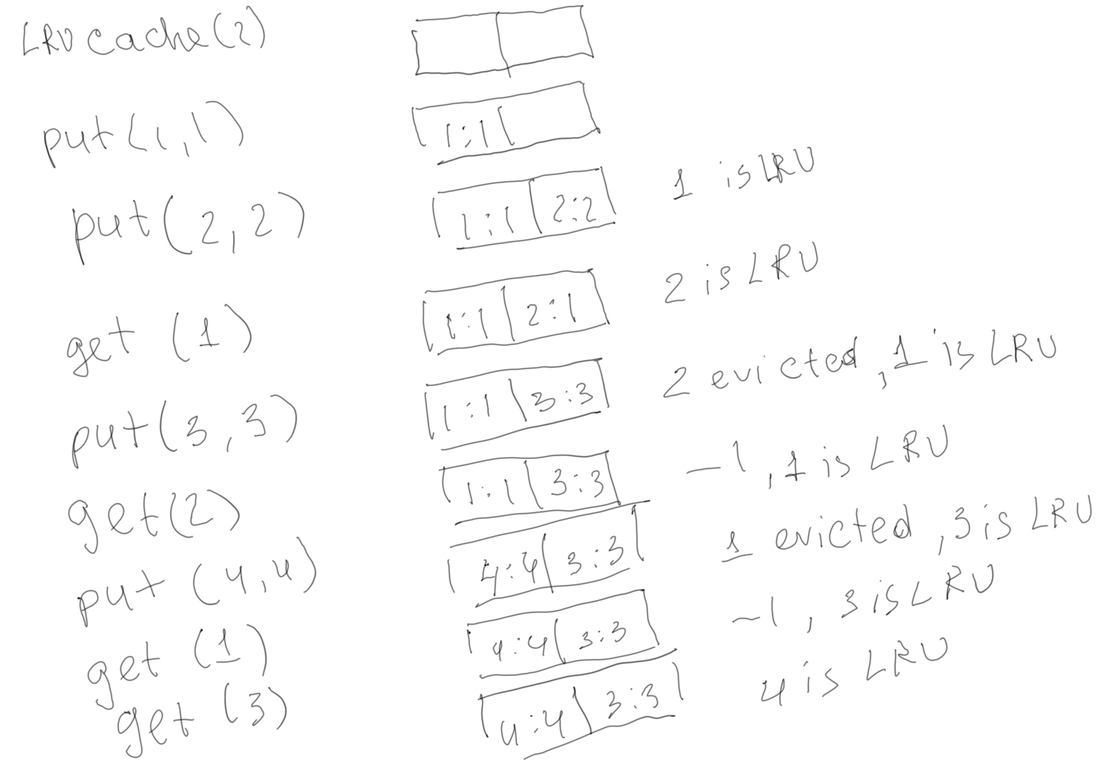Problem: LRU Cache
leetcode.com/problems/lru-cache/solution/
leetcode.com/problems/lru-cache/solution/
Design a data structure that follows the constraints of a Least Recently Used (LRU) cache.
Implement the LRUCache class:
LRUCache(int capacity)Initialize the LRU cache with positive sizecapacity.int get(int key)Return the value of thekeyif the key exists, otherwise return-1.void put(int key, int value)Update the value of thekeyif thekeyexists. Otherwise, add thekey-valuepair to the cache. If the number of keys exceeds thecapacityfrom this operation, evict the least recently used key.
Follow up:
Could you do get and put in O(1) time complexity?
Example 1:
Input
["LRUCache", "put", "put", "get", "put", "get", "put", "get", "get", "get"]
[[2], [1, 1], [2, 2], [1], [3, 3], [2], [4, 4], [1], [3], [4]]
Output
[null, null, null, 1, null, -1, null, -1, 3, 4]
Explanation
LRUCache lRUCache = new LRUCache(2);
lRUCache.put(1, 1); // cache is {1=1}
lRUCache.put(2, 2); // cache is {1=1, 2=2}
lRUCache.get(1); // return 1
lRUCache.put(3, 3); // LRU key was 2, evicts key 2, cache is {1=1, 3=3}
lRUCache.get(2); // returns -1 (not found)
lRUCache.put(4, 4); // LRU key was 1, evicts key 1, cache is {4=4, 3=3}
lRUCache.get(1); // return -1 (not found)
lRUCache.get(3); // return 3
lRUCache.get(4); // return 4
Constraints:
1 <= capacity <= 30000 <= key <= 30000 <= value <= 104- At most
3 * 104calls will be made togetandput.
SOLUTION
Introducing Ordered Dictionary collection
>>> from collections import OrderedDict >>> d = {1:1, 2:2, 3:3} >>> d = OrderedDict(d) >>> d OrderedDict([(1, 1), (2, 2), (3, 3)]) >>> d.move_to_end(2) >>> d OrderedDict([(1, 1), (3, 3), (2, 2)])
the Dictionary can also act as a stack or a queue:
stack - use popitem()
queue - use popitem(last=False)
>>> d OrderedDict([(1, 1), (3, 3), (2, 2)]) >>> d.popitem() (2, 2) >>> d OrderedDict([(1, 1), (3, 3)]) >>> d.popitem(last=False) (1, 1) >>> d OrderedDict([(3, 3)])
And the final solution is:
from collections import OrderedDict class LRUCache(OrderedDict): capacity = 0 def __init__(self, capacity: int): self.capacity = capacity def get(self, key: int) -> int: if key in self: self.move_to_end(key) return self[key] else: return -1 def put(self, key: int, value: int) -> None: if key in self: self.move_to_end(key) self[key] = value if len(self) > self.capacity: self.popitem(last=False)
